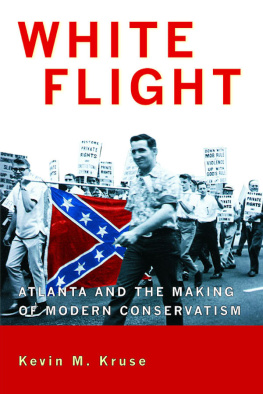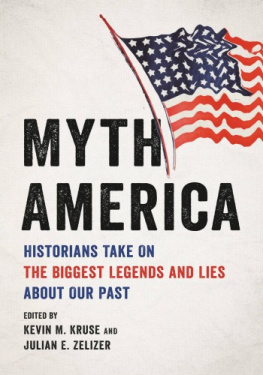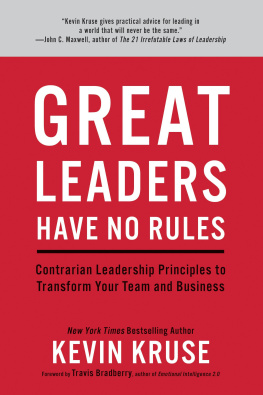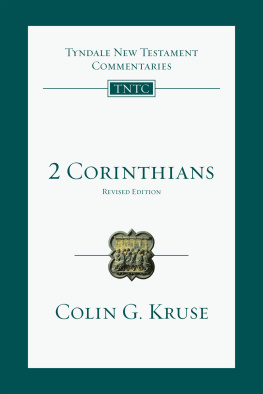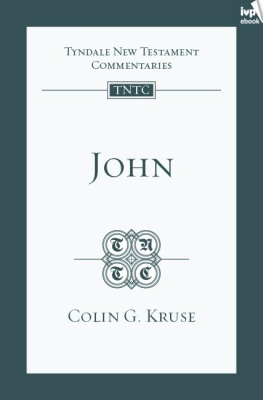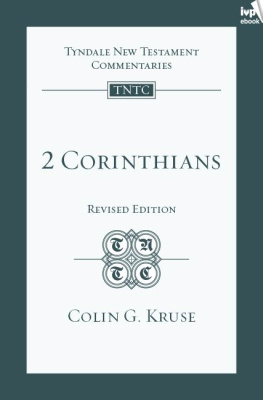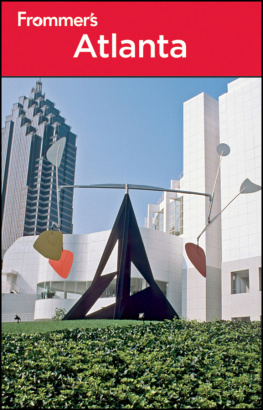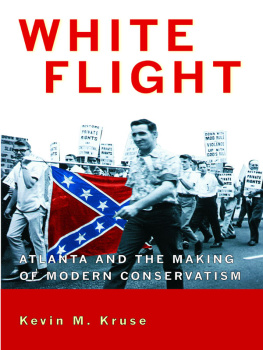Kevin M. Kruse - White Flight: Atlanta and the Making of Modern Conservatism
Here you can read online Kevin M. Kruse - White Flight: Atlanta and the Making of Modern Conservatism full text of the book (entire story) in english for free. Download pdf and epub, get meaning, cover and reviews about this ebook. year: 2007, publisher: Princeton University Press, genre: Politics. Description of the work, (preface) as well as reviews are available. Best literature library LitArk.com created for fans of good reading and offers a wide selection of genres:
Romance novel
Science fiction
Adventure
Detective
Science
History
Home and family
Prose
Art
Politics
Computer
Non-fiction
Religion
Business
Children
Humor
Choose a favorite category and find really read worthwhile books. Enjoy immersion in the world of imagination, feel the emotions of the characters or learn something new for yourself, make an fascinating discovery.
- Book:White Flight: Atlanta and the Making of Modern Conservatism
- Author:
- Publisher:Princeton University Press
- Genre:
- Year:2007
- Rating:5 / 5
- Favourites:Add to favourites
- Your mark:
- 100
- 1
- 2
- 3
- 4
- 5
White Flight: Atlanta and the Making of Modern Conservatism: summary, description and annotation
We offer to read an annotation, description, summary or preface (depends on what the author of the book "White Flight: Atlanta and the Making of Modern Conservatism" wrote himself). If you haven't found the necessary information about the book — write in the comments, we will try to find it.
White Flight: Atlanta and the Making of Modern Conservatism — read online for free the complete book (whole text) full work
Below is the text of the book, divided by pages. System saving the place of the last page read, allows you to conveniently read the book "White Flight: Atlanta and the Making of Modern Conservatism" online for free, without having to search again every time where you left off. Put a bookmark, and you can go to the page where you finished reading at any time.
Font size:
Interval:
Bookmark:

White Flight
POLITICS AND SOCIETY IN TWENTIETH-CENTURY AMERICA
Series Editors: William Chafe, Gary Gerstle, Linda Gordon, and Julian Zelizer
A list of titles in this series appears at the back of the book.
White Flight
ATLANTA AND THE MAKING
OF MODERN CONSERVATISM
Kevin M. Kruse
PRINCETON UNIVERSITY PRESS
PRINCETON AND OXFORD
Copyright 2005 by Princeton University Press
Published by Princeton University Press, 41 William Street,
Princeton, New Jersey 08540
In the United Kingdom: Princeton University Press, 3 Market Place,
Woodstock, Oxfordshire OX20 1SY
All Rights Reserved
Third printing, and first paperback printing, 2007
Paperback ISBN-13: 978-0-691-13386-7
The Library of Congress has cataloged the cloth edition of this book as follows
Kruse, Kevin Michael, 1972
White flight : Atlanta and the making of modern conservatism / Kevin M. Kruse.
p. cm. (Politics and society in twentieth-century America)
Includes bibliographical references and index.
ISBN 13:978-0-691-09260-7 (cloth : alk. paper)
ISBN 10:0-691-09260-5 (cloth : alk. paper)
1. Atlanta (Ga.)Race relations. 2. African AmericansSegregationGeorgia
AtlantaHistory20th century. 3. Atlanta (Ga.)Politics and government20th
century. 4. ConservatismGeorgiaAtlantaHistory20th century.
5. WhitesGeorgiaAtlantaMigrations20th century. 6. WhitesGeorgia
AtlantaPolitics and government20th century. 7. Government, Resistance to
AtlantaHistory20th century. I. Title. II. Series.
F294.A89A233 2005
305.8'009758231dc22 2004062468
British Library Cataloging-in-Publication Data is available
This book has been composed in Sabon
Printed on acid-free paper.
press.princeton.edu
Printed in the United States of America
10 9 8 7 6 5 4 3
for Lindsay
Contents
CHAPTER ONE |
CHAPTER TWO |
CHAPTER THREE |
CHAPTER FOUR |
CHAPTER FIVE |
CHAPTER SIX |
CHAPTER SEVEN |
CHAPTER EIGHT |
CHAPTER NINE |
EPILOGUE |
List of Illustrations
FIGURES |
MAPS |
Acknowledgments
THIS BOOK would not have been possible without the inspiration and support of colleagues, friends, and family. There are not enough pages here to thank them properly or enough time to express the depths of my debt to them all.
First, I must thank the three academic communities I have been lucky to call home. As an undergraduate at the University of North Carolina at Chapel Hill, I had the good fortune to learn from Kenneth Janken, John Kasson, and Harry Watson. My thesis adviser there, William Leuchtenburg, showed me at an early stage that a good historian pays attention not just to detail but to his students as well. Then, as a graduate student at Cornell, I thankfully found many more scholars in his mold: Tim Borstelmann, Michael Kammen, Mary Beth Norton, and Dan Usner, to name just a few. As I began my dissertation, my thesis committee, Dick Polenberg, Bob Harris, and Isabel Hull, provided intellectual stimulation, warm encouragement, and thoughtful advice. I especially wish to thank Dick Polenberg, my graduate adviser, whose incisive questions and suggestions improved the project considerably. And though he had no official role in the crafting of the dissertation, Nick Salvatore blessed me (and it) with innumerable bits of advice, words of encouragement, and an unflagging spirit of good humor and sharp wit. Finally, as a junior faculty member at Princeton, I have been lucky to have so many colleagues who are both rich with insight and generous with their time. In one form or another, the entire Department of Historyfaculty, staff, graduate and undergraduate studentshas helped make me a better historian and this a better book. But for the time they have spent reading my work and sharing their thoughts with me, I owe a special debt to Jeremy Adelman, Molly Greene, Dirk Hartog, Drew Isenberg, Bill Jordan, Steve Kotkin, Liz Lunbeck, Gyan Prakash, Dan Rodgers, Marc Rodriguez, Nell Painter, Peter Silver, Chris Stansell, Bob Tignor, and Sean Wilentz. Together, the department and the university have provided me with a model environment for intellectual growth and academic production.
Outside of those institutions, countless other scholars have helped this project as well. Sections of the manuscript have been presented as papers at annual meetings of the American Historical Association, the Organization of American Historians, the History of Education Society, and the Southern Historical Association, as well as at smaller conferences, workshops, and invited lectures at the University of Cambridge, the University of Georgia, the University of Oxford, the University of Pennsylvania, Princeton University, Saint Louis University Law School, and the University of Sussex. Many thanks to the warm and receptive audiences at these events and, of course, to the scholars who served as chairs or offered comments: Liz Cohen, Jane Dailey, Pete Daniel, Eddie Glaude, Arnold Hirsch, Yasuhiro Katagiri, Valinda Littlefield, Wendy Plotkin, Bryant Simon, Tom Sugrue, Mark Tushnet, and Wayne Urban. At a later stage, in February 2004, a conference on new themes in suburban history at Princeton let me exchange thoughts with, and learn from, an impressive collection of scholars: Betsy Blackmar, Sheryll Cashin, David Freund, Gerald Frug, Gary Gerstle, Jim Goodman, Arnold Hirsch, Matt Lassiter, Margaret OMara, Steve Macedo, Becky Nicolaides, Adam Rome, Robert Self, Peter Siskind, Tom Sugrue, and Andy Wiese. My thinking on what Ive come to call the politics of suburban secession developed from the wonderful discussions of that weekend.
For additional conversations and insights that shaped the book in important ways, I must also thank Tony Badger, Tomiko Brown-Nagin, Dan Carter, Bill Chafe, Mary Dudziak, Adam Fairclough, Jim Goodman, Linda Gordon, Michael Klarman, Wendell Pritchett, Tom Sugrue, and Stephen Tuck. In particular, Jim Patterson, Matt Lassiter, and Clive Webb deserve special thanks for their close reading of several chapters, while Liz Cohen has earned my endless gratitude for providing a thoughtful and encouraging review of the entire manuscript. Cliff Kuhn served double duty, not only helping me navigate the archives in Atlanta, but also putting his encyclopedic knowledge of the city to work in a close reading of the dissertation. My greatest academic debt goes to Gary Gerstle, who expressed confidence in the projects possibilities at an early stage and did more to aid in its realization than I ever might have hoped. His careful readings of the text and advice for revisions have been invaluable. Moreover, Gary and his fellow series editors provided a wonderful home for the manuscript, while my editor Brigitta van Rheinberg and the staff at Princeton University Press did a tremendous job transforming it into a book.
Next pageFont size:
Interval:
Bookmark:
Similar books «White Flight: Atlanta and the Making of Modern Conservatism»
Look at similar books to White Flight: Atlanta and the Making of Modern Conservatism. We have selected literature similar in name and meaning in the hope of providing readers with more options to find new, interesting, not yet read works.
Discussion, reviews of the book White Flight: Atlanta and the Making of Modern Conservatism and just readers' own opinions. Leave your comments, write what you think about the work, its meaning or the main characters. Specify what exactly you liked and what you didn't like, and why you think so.

